Unit 5 Do you want to watch a game show 第1课时 考点讲解(26张PPT)
文档属性
| 名称 | Unit 5 Do you want to watch a game show 第1课时 考点讲解(26张PPT) |
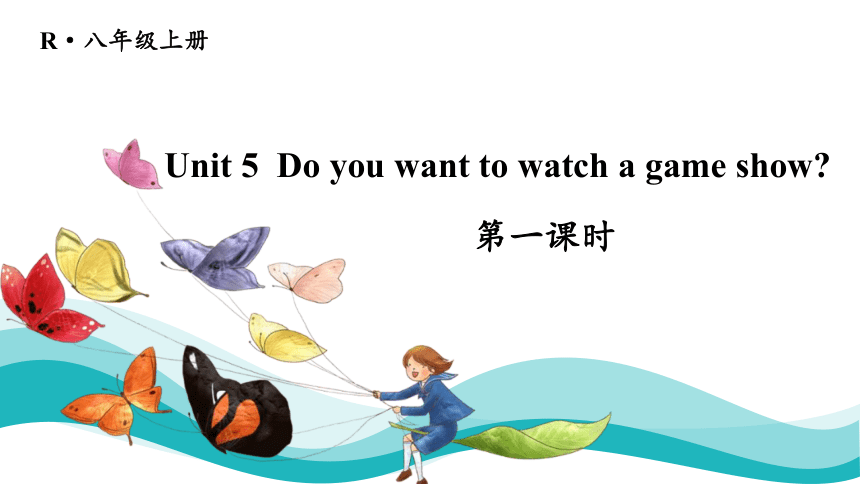
|
|
| 格式 | pptx | ||
| 文件大小 | 3.8MB | ||
| 资源类型 | 试卷 | ||
| 版本资源 | 人教新目标(Go for it)版 | ||
| 科目 | 英语 | ||
| 更新时间 | 2021-07-20 00:00:00 | ||
图片预览


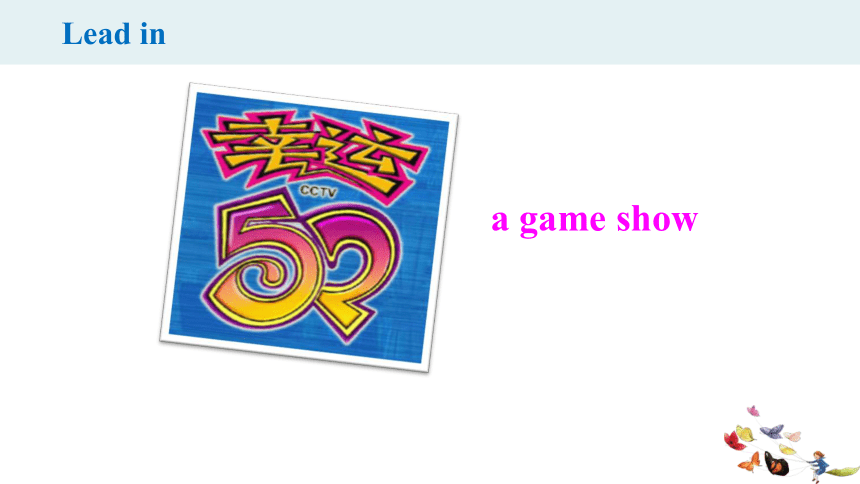
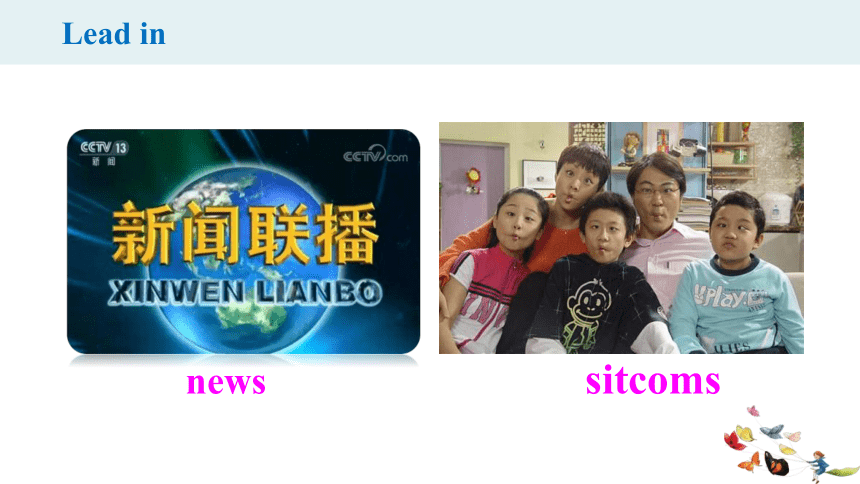

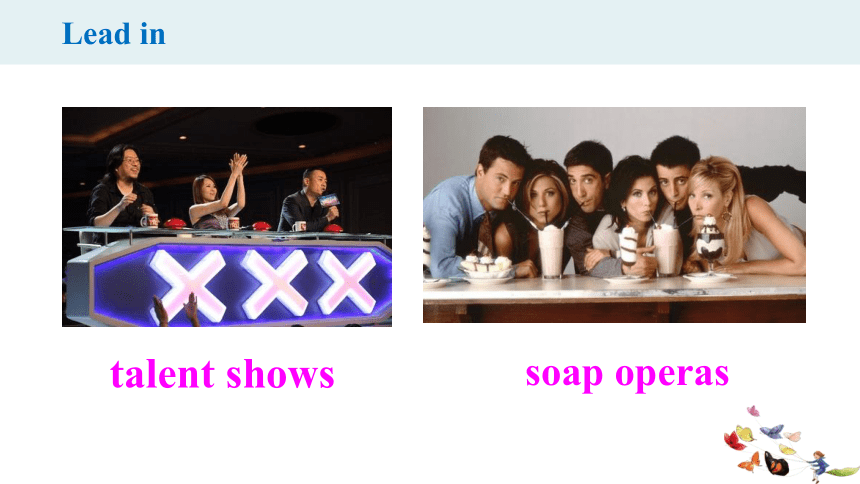
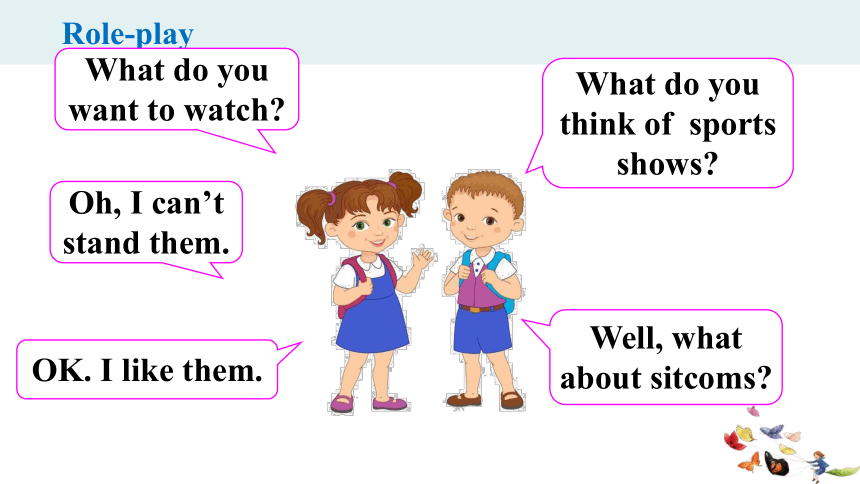
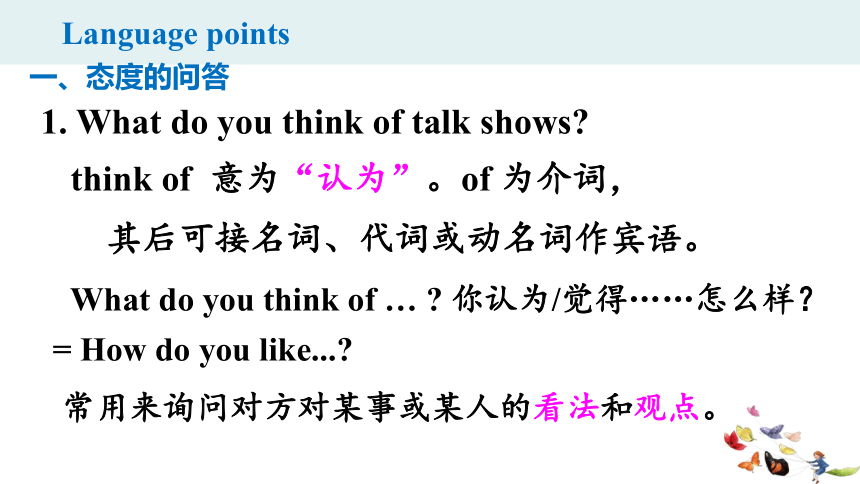
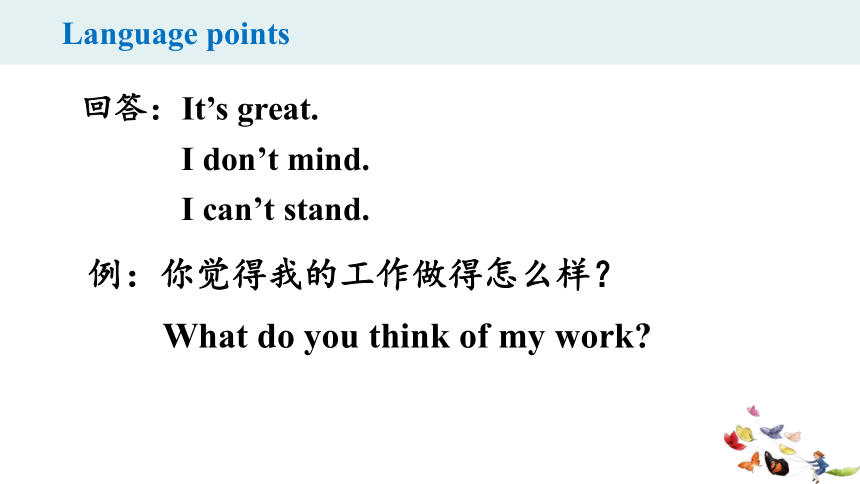
文档简介
Unit 5 Do you want to watch a game show?
第一课时
R·八年级上册
Lead in
Do you like watching TV? What kinds of TV shows do you know?
Lead in
a game show
Lead in
news
sitcoms
Lead in
sports shows
talk shows
Lead in
talent shows
soap operas
Role-play
What do you want to watch?
What do you think of sports shows?
Oh, I can’t stand them.
Well, what about sitcoms?
OK. I like them.
Language points
1. What do you think of talk shows?
What do you think of … ? 你认为/觉得……怎么样?
= How do you like...?
一、态度的问答
常用来询问对方对某事或某人的看法和观点。
think of 意为“认为”。of 为介词,
其后可接名词、代词或动名词作宾语。
Language points
例:你觉得我的工作做得怎么样?
回答:It’s great.
I don’t mind.
I can’t stand.
What do you think of my work?
Language points
think of 表示“对……有某种看法,认为”时,可与think about互换。
例:What do you think of /about the school trip?
你认为这次学校郊游怎么样?
Language points
4. What do you think of talk shows?
I don’t mind them.
mind 为动词, “介意;在乎;反对”,多用于疑问句、否定句和条件句中,通常用于征求对方许可,后接名词、动名词或条件状语从句。
Language points
love like
don’t mind don’t like
can’t stand
Language points
1. Lin Hui thinks she can learn from sitcoms.
learn…from… “从……中学习……;从
……获得……”。
多用于两种情况:
learn from sb./sth.或learn sth. from sb./sth.
二、learn相关的短语
Language points
What can you learn from the story?
Language points
2. learn to do sth. “学习做某事”
I want to learn to play the piano.
3. learn…by oneself “自学”
(同义短语:teach oneself... )
The man can learn English by himself.
=The man can teach himself English.
Language points
4. learn about “了解”
例:We should learn more about Chinese history.
我们应该更多地了解中国历史。
Language points
Because I hope to find out what’s going on around the world.
hope作动词,“希望;期望”,不能接名词、动名词作宾语,也不能接复合宾语。
一般接动词不定式hope to do sth. “希望做某事”;
还能接that引导的宾语从句hope that... “希望……”。
三、hope的短语
Language points
例:我希望马上宣布胜利者的名字。
I hope to announce the winner shortly.
我希望你能更加努力学习。
I hope that you can study harder.
Language points
I like to follow the story and see what happens next.
happen不及物动词, “发生;出现”。用法主要有三种.
四、happen的用法
Language points
1. sth. +happen+地点/时间
What’s happening outside?
Language points
2. sth.+ happen to +sb.
某人出了某事(常指不好的事发生在某人身上)
A car accident happened to him yesterday.
Language points
3. sb.+ happen+ to do sth. 某人碰巧做某事
I happened to meet her in the street.
Language points
{16D9F66E-5EB9-4882-86FB-DCBF35E3C3E4}
“发生;碰巧”,用于偶然
或突发性事件。
He happened to know the place.
take place
“发生;举行;举办”,非偶然性事件的“发生”,即这种事件的发生一定有某种原因或事先的安排。
The meeting will take place soon.
happen
Practice
1. _____ to him yesterday?
A. What did happen B. What did he happen
C. What happened
2. Can you learn ____ from the man?
A. a lot B. lots of C. a lot of
Class summary
Unit 5 Do you want to watch a game show?
1. What do you think of talk shows?
2. I don’t mind them.
3. Lin Hui thinks she can learn from sitcoms.
4. Because I hope to find out what’s going on around the world.
5. I like to follow the story and see what happens next.
Thank you!
第一课时
R·八年级上册
Lead in
Do you like watching TV? What kinds of TV shows do you know?
Lead in
a game show
Lead in
news
sitcoms
Lead in
sports shows
talk shows
Lead in
talent shows
soap operas
Role-play
What do you want to watch?
What do you think of sports shows?
Oh, I can’t stand them.
Well, what about sitcoms?
OK. I like them.
Language points
1. What do you think of talk shows?
What do you think of … ? 你认为/觉得……怎么样?
= How do you like...?
一、态度的问答
常用来询问对方对某事或某人的看法和观点。
think of 意为“认为”。of 为介词,
其后可接名词、代词或动名词作宾语。
Language points
例:你觉得我的工作做得怎么样?
回答:It’s great.
I don’t mind.
I can’t stand.
What do you think of my work?
Language points
think of 表示“对……有某种看法,认为”时,可与think about互换。
例:What do you think of /about the school trip?
你认为这次学校郊游怎么样?
Language points
4. What do you think of talk shows?
I don’t mind them.
mind 为动词, “介意;在乎;反对”,多用于疑问句、否定句和条件句中,通常用于征求对方许可,后接名词、动名词或条件状语从句。
Language points
love like
don’t mind don’t like
can’t stand
Language points
1. Lin Hui thinks she can learn from sitcoms.
learn…from… “从……中学习……;从
……获得……”。
多用于两种情况:
learn from sb./sth.或learn sth. from sb./sth.
二、learn相关的短语
Language points
What can you learn from the story?
Language points
2. learn to do sth. “学习做某事”
I want to learn to play the piano.
3. learn…by oneself “自学”
(同义短语:teach oneself... )
The man can learn English by himself.
=The man can teach himself English.
Language points
4. learn about “了解”
例:We should learn more about Chinese history.
我们应该更多地了解中国历史。
Language points
Because I hope to find out what’s going on around the world.
hope作动词,“希望;期望”,不能接名词、动名词作宾语,也不能接复合宾语。
一般接动词不定式hope to do sth. “希望做某事”;
还能接that引导的宾语从句hope that... “希望……”。
三、hope的短语
Language points
例:我希望马上宣布胜利者的名字。
I hope to announce the winner shortly.
我希望你能更加努力学习。
I hope that you can study harder.
Language points
I like to follow the story and see what happens next.
happen不及物动词, “发生;出现”。用法主要有三种.
四、happen的用法
Language points
1. sth. +happen+地点/时间
What’s happening outside?
Language points
2. sth.+ happen to +sb.
某人出了某事(常指不好的事发生在某人身上)
A car accident happened to him yesterday.
Language points
3. sb.+ happen+ to do sth. 某人碰巧做某事
I happened to meet her in the street.
Language points
{16D9F66E-5EB9-4882-86FB-DCBF35E3C3E4}
“发生;碰巧”,用于偶然
或突发性事件。
He happened to know the place.
take place
“发生;举行;举办”,非偶然性事件的“发生”,即这种事件的发生一定有某种原因或事先的安排。
The meeting will take place soon.
happen
Practice
1. _____ to him yesterday?
A. What did happen B. What did he happen
C. What happened
2. Can you learn ____ from the man?
A. a lot B. lots of C. a lot of
Class summary
Unit 5 Do you want to watch a game show?
1. What do you think of talk shows?
2. I don’t mind them.
3. Lin Hui thinks she can learn from sitcoms.
4. Because I hope to find out what’s going on around the world.
5. I like to follow the story and see what happens next.
Thank you!
同课章节目录
- Unit 1 Where did you go on vacation?
- Section A
- Section B
- Unit 2 How often do you exercise?
- Section A
- Section B
- Unit 3 I'm more outgoing than my sister.
- Section A
- Section B
- Unit 4 What's the best movie theater?
- Section A
- Section B
- Unit 5 Do you want to watch a game show?
- Section A
- Section B
- Unit 6 I'm going to study computer science.
- Section A
- Section B
- Unit 7 Will people have robots?
- Section A
- Section B
- Unit 8 How do you make a banana milk shake?
- Section A
- Section B
- Unit 9 Can you come to my party?
- Section A
- Section B
- Unit 10 If you go to the party, you'll have a grea
- Section A
- Section B
